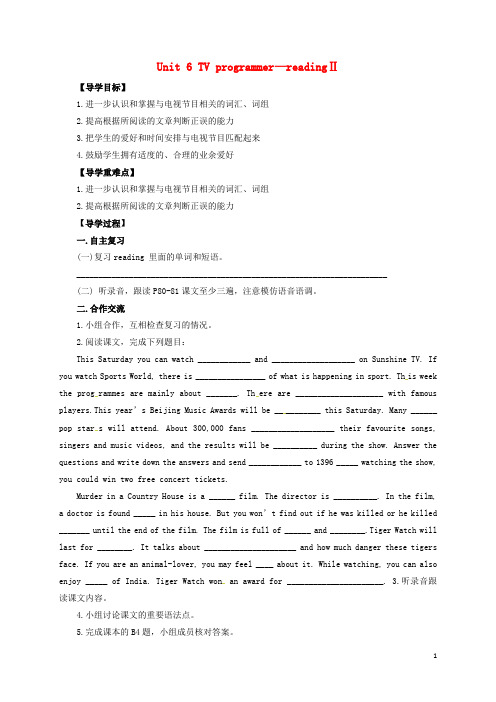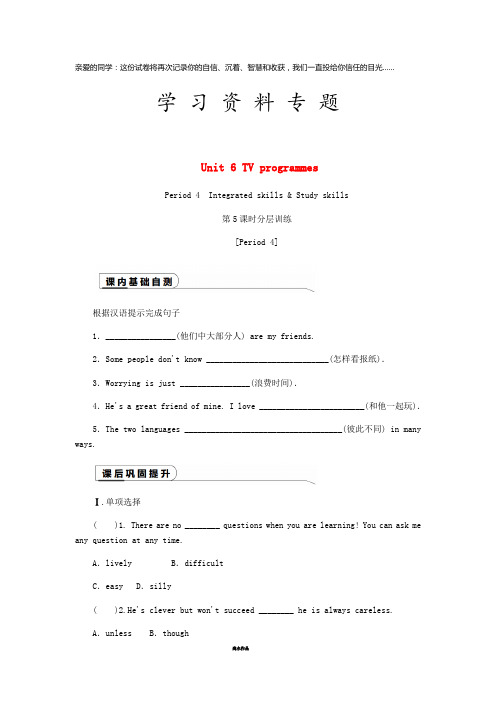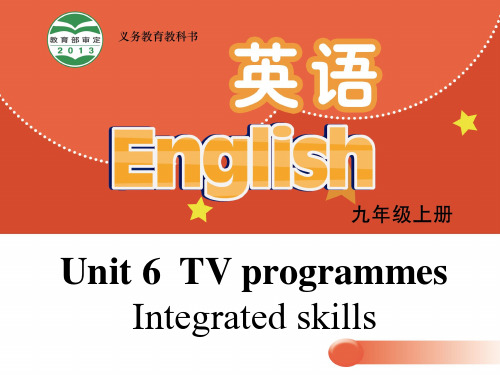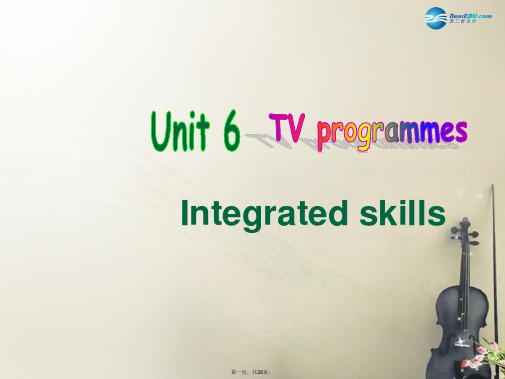辽宁省锦州市凌海市九年级英语上册Unit6TVprogrammesIntegratedskills导学案牛津版课件
- 格式:doc
- 大小:52.00 KB
- 文档页数:3

Unit 6 TV programmer—readingⅡ【导学目标】1.进一步认识和掌握与电视节目相关的词汇、词组2.提高根据所阅读的文章判断正误的能力3.把学生的爱好和时间安排与电视节目匹配起来4.鼓励学生拥有适度的、合理的业余爱好【导学重难点】1.进一步认识和掌握与电视节目相关的词汇、词组2.提高根据所阅读的文章判断正误的能力【导学过程】一.自主复习(一)复习reading 里面的单词和短语。
_______________________________________________________________________(二) 听录音,跟读P80-81课文至少三遍,注意模仿语音语调。
二.合作交流1.小组合作,互相检查复习的情况。
2.阅读课文,完成下列题目:This Saturday you can watch ____________ and ___________________ on Sunshine TV. If you watch Sports World, there is ________________ of what is happening in sport. Th is week the prog rammes are mainly about _______. Th ere are ____________________ with famous players.This year’s Beijing Music Awards will be __________ this Saturday. Many ______ pop star s will attend. About 300,000 fans ___________________ their favourite songs, singers and music videos, and the results will be __________ during the show. Answer the questions and write down the answers and send ____________ to 1396 _____ watching the show, you could win two free concert tickets.Murder in a Country House is a ______ film. The director is __________. In the film, a doctor is found _____ in his house. But you won’t find out if he was killed or he killed _______ until the end of the film. The film is full of ______ and ________.Tiger Watch will last for ________. It talks about _____________________ and how much danger these tigers face. If you are an animal-lover, you may feel ____ about it. While watching, you can also enjoy _____ of India. Tiger Watch won an award for ______________________. 3.听录音跟读课文内容。

亲爱的同学:这份试卷将再次记录你的自信、沉着、智慧和收获,我们一直投给你信任的目光……学习资料专题Unit 6 TV programmesPeriod 4 Integrated skills & Study skills第5课时分层训练[Period 4]根据汉语提示完成句子1.________________(他们中大部分人) are my friends.2.Some people don't know ____________________________(怎样看报纸).3.Worrying is just ________________(浪费时间).4.He's a great friend of mine. I love ________________________(和他一起玩).5.The two languages ____________________________________(彼此不同) in many ways.Ⅰ.单项选择( )1. There are no ________ questions when you are learning! You can ask me any question at any time.A.lively B.difficultC.easy D.silly( )2.He's clever but won't succeed ________ he is always careless.A.unless B.thoughC.and D.because( )3.2017·哈尔滨改编My favourite TV programme is Readers. I think we should spend as much time as we can ________ in our spare time.A.read B.to readC.reading D.reads( )4.2016·烟台Many teenagers don't like to talk with their parents. But I am ________ them. I love to share my joy and sorrow with my parents.A.the same as B.different fromC.interested in D.angry withⅡ. 2017·达州阅读理解For thousands of years, poetry has been the favourite type of literature(文学) for many in China. Chinese literature is one of the major parts of China's ancient traditions, and Chinese poetry is just like the best prize in this famous culture's literary treasure house.There were many famous poets from different periods of time in Chinese history, and thousands of their poems are still read and appreciated(欣赏) today.To remind people of those classic Chinese poems and to promote(推广) cultural heritage(遗产), CCTV has produced a TV show—Chinese Poetry Competition. The final of the hit show's second season was shown on Feb 7, 2017.Wu Yishu, 16, who studies at the High School Affiliated to Fudan University in Shanghai, came out on top. In an earlier programme, Wu wowed(赢得喝彩) the audience when performing in a section entitled “Feihualing”.“I really admire her knowledge of poems,” said Huang Zijin, 16, a senior 2 student from Ningbo High School. “What's more, she always seems so calm throughout the show, which is very unusual for her age.” As the old saying goes:“One who is filled with knowledge always behaves with elegance (优雅).”“Learning poems isn't about winning or losing. The power of poetry lies in shaping one's view of life and developing one's inner world,” said Li Bo, an expert guest at the Chinese Poetry Competition's second season. Li Dingguang told China._org._cn,_“It's important to help stud ents truly appreciate the artistry and fun of poetry.”( )1.What is like the best prize in this famous culture's literary treasure house?A.Chinese poetry.B.Chinese literature.C.China's ancient traditions.D.China's ancient culture.( )2.Who won the first prize in the Chinese Poetry Competition?A.Li Dingguang. B.Li Bo.C.Huang Zijin. D.Wu Yishu.( )3.According to the article, which of the following is FALSE?A.Thousands of famous poets' poems are still read and appreciated today.B.Wu Yishu appeared so calm throughout the show.C.It's unimportant to help students truly appreciate the artistry and fun of poetry.D.Li Bo said, “Learning poems isn't about winning or losing”.( )4.Which is the best little of the passage?A.Enjoying Beautiful LiteratureB.Enjoying Beautiful PoetryC.Joining English Speaking CompetitionD.Holding Chinese Literature Competition详解详析Period 4 Integrated skills & Study skills【课时分层训练】课内基础自测1.Most of them2.how to read newspapers/a newspaper3.a waste of time 4.playing with him5.are different from each other课后巩固提升Ⅰ.1.D 2.D3.C 考查非谓语动词。

Unit6 TV programmesIntegrated skillsTeaching goals:1.知识与技能: 进一步认识和掌握与电视节目相关的词汇、词组。
2.过程与方法: 通过分析所给材料获取重要信息并能够在阅读已有的信息后预测未知信息。
通过听录音获取新信息,并能通过合理猜测完成听力练习。
3.情感、态度与价值观: 学会表达喜欢和不喜欢,并说明原因。
Important and difficult points:用已获取的材料的关键词汇和信息来完成报告Teaching procedures:.任务一:Presentation1. Today we’re going to talk about TV viewing habits. Then ask:What TV programmes do you like or dislike?What’s your favourite programme? Why?How much time do you spend watching TV every week?2. Say: Would you like to know the TV viewing habits of some students at SUNshine MiddleSchool? M illie wants to interview three students about their TV viewing habits.Before the interviews, she has written down what she knew about the students. Let’s read the information in Part A1 and help the students to guess their favorite TV programme(s).favorite TV program me(s)任务二:听力。

牛津译林版英语九上Unit 6《TV programmes》(Integrated skills)教学设计一. 教材分析《牛津译林版英语九上Unit 6 TV programmes》主要介绍了不同类型的电视节目。
本节课的主题与学生的生活紧密相连,有助于激发他们的学习兴趣。
教材包括不同类型的电视节目,如新闻、综艺节目、纪录片等,以及与电视节目相关的话题,如电视节目对人们的影响、如何选择电视节目等。
通过对这些话题的学习,学生可以提高自己的英语听说读写能力,同时培养自己的审美观和批判思维能力。
二. 学情分析学生在之前的学习中已经掌握了一定的英语基础,能够进行简单的英语交流。
但部分学生对于某些电视节目的类型和特点可能了解不多,因此在教学过程中需要引导学生进行观察、思考和讨论。
此外,学生可能对英语学习存在一定的焦虑情绪,需要教师在教学中给予鼓励和关爱,激发他们的学习兴趣。
三. 教学目标1.知识目标:学生能够掌握不同类型的电视节目以及与电视节目相关的话题。
2.能力目标:学生能够用英语介绍自己喜欢的电视节目,并表达自己的看法。
3.情感目标:培养学生对电视节目的审美观和批判思维能力,提高他们对英语学习的兴趣。
四. 教学重难点1.重点:学生能够用英语介绍不同类型的电视节目。
2.难点:学生能够表达自己对电视节目的看法,并进行批判性思考。
五. 教学方法1.任务型教学法:通过完成各种任务,激发学生的学习兴趣,培养他们的实践能力。
2.交际型教学法:通过小组讨论、角色扮演等活动,提高学生的英语交际能力。
3.情境教学法:创设真实的语境,帮助学生更好地理解和运用英语。
六. 教学准备1.教师准备:提前准备好相关电视节目的素材,如视频、图片等。
2.学生准备:学生预习课文,了解不同类型的电视节目。
七. 教学过程1.导入(5分钟)教师通过提问方式引导学生谈论他们喜欢的电视节目,激发学生的学习兴趣。
2.呈现(10分钟)教师展示不同类型的电视节目素材,如新闻、综艺节目、纪录片等,引导学生观察并说出它们的特点。


译林版英语九年级(上)Unit 6TV programmes 知识点一.重点词组1.a weekly round-up一周要闻综述2.be covered live 被现场直播3.send text messages to 1396发送文本信息到13964.win two free concert tickets赢得两张免费的音乐会门票5.a horror film directed by sb一部由某人导演的恐怖片6.be full of horror and mysteries 充满恐怖和神秘7.enjoy solving mysteries喜欢解谜8.get scared easily 容易受惊吓9.a one—hour documentary一部一小时的纪录片10.take a close look at…近距离地看一看……11.say sth in a low voice用低声说某事12.cry for help 尖叫求助13.1ive in the wild 住在野外14.hunt for their own food 自己捕取食物15.have little interest in 对……不感兴趣16.be a waste of time 浪费时间17.receive a message from….收到来自……的信息18.call the police at once 立即报警19.three men in police uniforms 三个穿警服的人20.catch the readers’attention 吸引读者的注意力二、重点句型1.我觉得由他主持的脱口秀节目值得一看,因为它提供了人们一次近距离观察名人生活的机会。
I think the talk show hosted by himis worth watching,because it provides people with a chance to take a closelook at famous people’s life.2.这档体育节目涉及了很多体育项目,包括足球篮球和游泳。
九年级上册Unit6 Integrated skills一、教学目标1.通过分析所给材料来获取重要信息。
2.通过听录音获取新信息,并能通过合理猜测完成听力练习。
3.用已知材料中的关键信息完成报告。
4.学会表达喜欢和不喜欢,并说明原因教学重、难点1.通过听录音获取信息,完成听力练习,并根据已知材料的关键信息完成报告。
2. 学会表达喜欢和不喜欢,并说明原因。
二、词汇、短语三、句型(语法)1. Watching TV ads is just a waste of time. 看电视广告就是浪费时间。
waste 为名词“浪费”,waste还可用作动词,表示“浪费”。
e.g. a waste time/ money 浪费时间/钱2. TV viewing habitsview n.视野,风景,见解e.g. His view of life is different from yours. 他的人生观与你的不同。
I would like to enjoy the beautiful views of Mount Huang.我想欣赏黄山的美景v.看,考虑 e.g. The attack on the ship was viewed as an act of war. 攻击了那条船已视作战争行为。
3.We look forward to hearing from you soon.hear from sb ...意为:收到某人的来信= get / receive a letter from sb look forward to sth/ doing sth. 期望做某事(注意:to是介词)4. a 5-year-old boy 五岁大的,5-year-old只能修饰名词,.类似的例如:an 18-floor building a 2-hour film.5. On one’s way to....意为:在某人去...的路上。
TV programmes教学目标知识目标To make sure the students understand the use of to-infinitives forpurpose.To be able to use verbs + objects + to-infinitives to make sentences. 能力目标To make sure the students understand the use of to-infinitives forpurpose.To be able to use verbs + objects + to-infinitives to make sentences. 情感目标To make sure the students understand the use of to-infinitives forpurpose.To be able to use verbs + objects + to-infinitives to make sentences.教学重点the use of to-infinitives教学难点the use of to-infinitives教学设计Teaching aids: A computer, notebooks and work sheets. a calendaTeaching methods: Listening 、reading、acting& Discussing教学过程教师活动内容、方式学生活动备注(个性化设计) Step1 PresentationTranslation1.他来上海拜访他的朋友。
2.政府应该立法来保护野生生物。
3.为了省钱,她每天回家吃午饭。
4.为了赢得下个月的比赛,他们每天刻苦训练。
Use these sentences to give the students some examples about to-infinitives for purpose. TranslatePresentStep 2 Introduce the uses of to-infinitives for purposeWe can use to-in finitives to express purpose.e.g. I often go to the market to watch birds.Now the Chinese government has made laws to prevent all these things.We can also use in order to to express purposes. This is more formal t han to-infinitives.e.g. Some peop le want to make the wetlands smallerin order to have more space for farms and buildings.Take a notebook with you in order to wri te down what you see. Learn the uses ofto-infinitives forpurpose Learn the uses ofto-infinitivesfor purpose1.Match the first parts of the sentences on theleft with theDo exercises Exercises 教师活动内容、方式学生活动备注(个性化设计) second parts on the right.Write the correct letters in the blanks.(Page 73)2.More exercises1.我呆在那儿看看会发生什么。
牛津译林版九年级上册Unit 6《TV programmes》(Integrated skills)教学设计一. 教材分析本课选自牛津译林版九年级上册Unit 6《TV programmes》(Integrated skills),主要讲述了电视节目的类型及特点。
教材包括阅读文本、听力材料及综合语言运用任务。
通过本课学习,学生能够掌握电视节目的分类,提高听说读写能力,培养对不同类型节目的兴趣。
二. 学情分析九年级学生已具有一定的英语基础,对日常生活中的电视节目有所了解。
但部分学生英语听说能力较弱,对电视节目的分类及特点认识不足。
因此,在教学过程中,需要关注学生的个体差异,激发学生的学习兴趣,提高他们的英语实际运用能力。
三. 教学目标1.知识目标:–掌握电视节目的分类及特点;–学会描述自己喜欢的电视节目。
2.能力目标:–提高学生的听说读写能力;–培养学生的综合语言运用能力。
3.情感目标:–培养学生对不同类型电视节目的兴趣;–提高学生英语学习的自信心。
四. 教学重难点1.重点:电视节目的分类及特点;2.难点:如何描述自己喜欢的电视节目。
五. 教学方法1.任务型教学法:通过完成各种任务,激发学生的学习兴趣,培养学生的合作精神;2.情境教学法:创设真实情境,让学生在实际语境中学习英语;3.交际法:鼓励学生积极参与课堂交际,提高口语表达能力。
六. 教学准备2.多媒体设备;3.电视节目图片;4.相关电视节目视频片段。
七. 教学过程1.导入(5分钟)–教师展示各种电视节目图片,引导学生谈论自己喜欢的电视节目;–学生分享喜欢的电视节目,教师简要介绍本课要学习的电视节目分类。
2.呈现(10分钟)–教师通过课件呈现电视节目的分类及特点;–学生跟随教师一起朗读,熟悉电视节目的分类及特点。
3.操练(10分钟)–教师播放一段电视节目视频片段,学生猜测节目类型;–学生分组讨论,总结各个电视节目的特点;–学生代表上台展示讨论成果,教师给予评价。
Unit 6 TV programmer-- Integrated skills 【学习目标】
1.通过分析所给材料来获取重要信息。
2.通过听录音获取新信息,并能通过合理猜测完成听力练习。
3.用已知材料中的关键信息完成报告。
4.学会表达喜欢和不喜欢,并说明原因。
【学习重难点】
1.用已知材料中的关键信息完成报告。
2.学会表达喜欢和不喜欢,并说明原因。
【导学过程】
自主预习
1.听integrated skills的录音以及阅读课本内容,找出里面的新单词和词组。
2.完成课本A1,A2,A3题。
3.预习检测:英汉互译
A.熟记下列单词
攻击,进攻_________________
北极熊_________________
雄性的_________________
摄影棚;录音室_________________
小型公共汽车;中巴_________________
观看_________________
傻得;愚蠢的_________________
浪费_________________
合作交流
一.小组之间合作,检测预习情况。
二.仔细听integrated skills里面的内容,回答下列问题:
Read Part Al on P87, and answer:
I.What do you know about Anita?
2.What do you know about Philip?
3.What do you know about Sam?
C. Read P88 Speak up and answer the questions:
1. Does Millie like TV ads? why?
2. Does S imon like TV ads? why?
三.小组听录音,并且圈出课本里面的重点和难点的句子。
四.预习课本speak up的对话,分角色朗读对话,并表演出来,评出最优组。
五.小组总结本节课的语法知识点。
学习反思
________________________________________________________________________
课堂检测
一. 根据句意及汉语提示完成句子
1. Stop asking such . (愚蠢) questions!
2. These meetings are a (浪费)of time.
3. If you want to develop the (习惯) of running, run almost every day
4. No lesson is (无聊的),if you are interested in it.
5. We can see many (节目) on the Intemet now.
二. 根据汉语提示完成句子
1. Some people don't know (怎样看报纸).
2. (他们中大部分)are my friends
3. Worrying is just_ (浪费时间).
4. He is a g reat friend of mine. I love (和他一起玩)
5. The two languages (彼此不同)in many ways.
参考答案:
一. 1. silly 2.waste 3.habit 4.boring 5.programmes
二.1.how to read newspaper 2.Most of them 3.wasting time 4.play with them
5.are different。